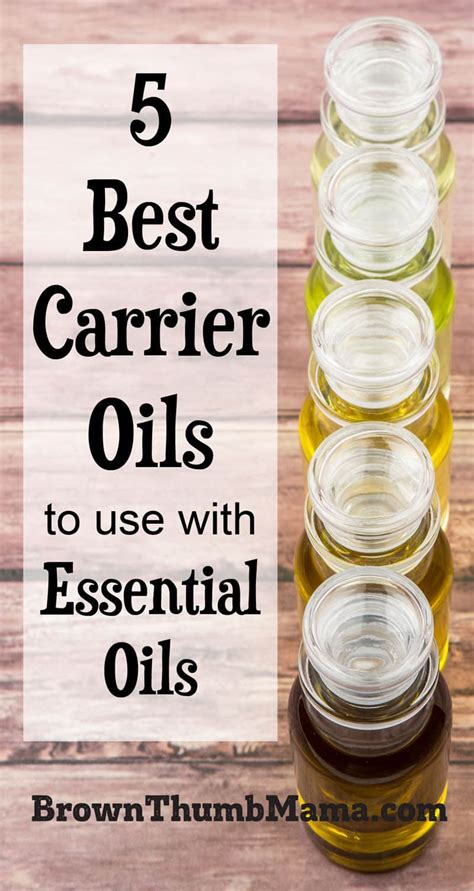Introduction
Carrier oils, also known as base oils or vegetable oils, are commonly used to dilute essential oils before they are applied to the skin. They play a vital role in aromatherapy and various other applications, as they help enhance the absorption and effectiveness of essential oils while ensuring their safe use.

What Are Carrier Oils?
Carrier oils are natural, plant-based oils that are typically derived from the seeds, kernels, or nuts of plants. They are composed of triglycerides, which are fatty acid molecules that provide a stable and non-volatile base for essential oils.
Types of Carrier Oils
There are numerous types of carrier oils available, each with its unique properties and benefits. Some of the most commonly used carrier oils include:
- Jojoba oil: Known for its moisturizing and antioxidant properties
- Coconut oil: Has a high fatty acid content and is commonly used in skincare and hair care products
- Sweet almond oil: Rich in vitamins and minerals, making it suitable for sensitive skin
- Grapeseed oil: Lightweight and easily absorbed, making it ideal for massage and skincare
- Avocado oil: Contains antioxidants and vitamins, promoting skin health and hydration
Benefits of Carrier Oils
Carrier oils offer numerous benefits, including:
- Dilution: They dilute the concentrated essential oils, making them safe for topical application.
- Absorption: They facilitate the absorption of essential oils into the skin, allowing them to reach their target tissues.
- Protection: They protect the skin from potential irritation or allergic reactions caused by undiluted essential oils.
- Moisturization: Many carrier oils have moisturizing properties, nourishing and hydrating the skin.
- Soothing: Some carrier oils, such as lavender oil, have calming and soothing effects, promoting relaxation and sleep.
How to Choose the Right Carrier Oil
Choosing the right carrier oil depends on the desired application and skin type. Consider the following factors:
- Skin type: Dry skin may benefit from heavier oils like coconut or avocado oil, while oily skin may prefer lighter oils like grapeseed or jojoba oil.
- Application: Massage oils should be easily absorbed, while skincare oils can be heavier and more emollient.
- Personal preference: Some carrier oils have distinct scents, so choose one that appeals to your olfactory senses.
Guidelines for Using Carrier Oils
When using carrier oils, follow these guidelines:
- Dilution ratio: The recommended dilution ratio for essential oils varies depending on the oil and intended use. Typically, a ratio of 1-2 drops of essential oil to 10-20 drops of carrier oil is safe for topical application.
- Test for allergies: Always perform a patch test on a small area of skin before using a new carrier oil to check for any allergic reactions.
- Avoid ingestion: Carrier oils should not be ingested orally.
Creative Applications of Carrier Oils
Beyond aromatherapy and skincare, carrier oils have various other applications, including:
- Hair care: As hair oils, carrier oils can nourish and strengthen hair.
- Massage: Mixed with essential oils, carrier oils create soothing and relaxing massage blends.
- Personal care: Carrier oils can be used as a base for homemade lotions, creams, and soaps.
- Cleaning: Some carrier oils, such as coconut oil, can be used as natural cleaning agents.
Table 1: Comparison of Carrier Oils
| Carrier Oil | Suitable for | Benefits |
|---|---|---|
| Jojoba oil | All skin types | Moisturizing, antioxidant |
| Coconut oil | Dry skin | High fatty acid content, antimicrobial |
| Sweet almond oil | Sensitive skin | Rich in vitamins, minerals |
| Grapeseed oil | All skin types | Lightweight, easily absorbed |
| Avocado oil | Dry, mature skin | Antioxidant-rich, hydrating |
Table 2: Dilution Ratios for Essential Oils
| Essential Oil | Dilution Ratio |
|---|---|
| Lavender oil | 2-5 drops per 10 ml carrier oil |
| Tea tree oil | 1 drop per 10 ml carrier oil |
| Peppermint oil | 1-2 drops per 10 ml carrier oil |
| Eucalyptus oil | 1-2 drops per 10 ml carrier oil |
| Frankincense oil | 3-5 drops per 10 ml carrier oil |
Table 3: Benefits of Carrier Oils for Skin
| Carrier Oil | Benefits |
|---|---|
| Jojoba oil | Moisturizes, balances oily skin |
| Coconut oil | Antibacterial, antifungal, hydrating |
| Sweet almond oil | Soothes sensitive skin, reduces inflammation |
| Grapeseed oil | Antioxidant-rich, protects skin from environmental damage |
| Avocado oil | Repairs and regenerates skin, reduces wrinkles |
Table 4: Applications of Carrier Oils
| Application | Carrier Oil | Benefits |
|---|---|---|
| Aromatherapy | Jojoba oil, sweet almond oil | Dilutes essential oils for safe topical use |
| Skincare | Coconut oil, avocado oil | Nourishes, moisturizes, and protects skin |
| Hair care | Jojoba oil, grapeseed oil | Strengthens and conditions hair |
| Massage | Sweet almond oil, grapeseed oil | Promotes relaxation and well-being |
| Personal care | Coconut oil, jojoba oil | Makes homemade lotions, creams, and soaps |
Frequently Asked Questions
Q: Can I use carrier oils on their own?
A: Yes, carrier oils can be used alone as moisturizers or massage oils. However, they are most commonly used to dilute essential oils for topical application.
Q: What is the shelf life of carrier oils?
A: The shelf life of carrier oils varies depending on the oil and storage conditions. Generally, they can be stored for 6-12 months at room temperature.
Conclusion
Carrier oils are essential components of aromatherapy and various other applications. Their ability to dilute and enhance the absorption of essential oils makes them a valuable tool for promoting health, well-being, and personal care. By choosing the right carrier oil for your specific needs and following the recommended guidelines, you can reap the numerous benefits of carrier oils and enjoy their versatility
